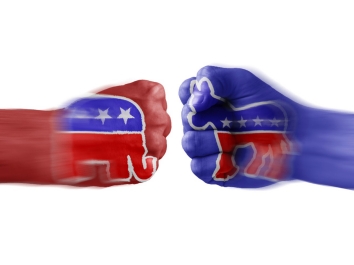An analysis of over 20,000 people from the General Social Survey between 1973 and 2014 found that support for environmental spending consistently plummeted during the administrations of Presidents Jimmy Carter, Bill Clinton and Barack Obama. There are other known factors in regulatory support; the older people get the less they support more regulations, but it is a surprise to find that relative support for environmental regulation changes depending on which party is in the White House.
There are two reasons it could be so. Environmentalism could be a campaign issue but when victory is achieved, there is instead support for unions and other groups that spent heavily to get Democrats elected. Or it could be that Republicans are only opposed to regulation when a Democrat wants it.

On the first argument, the Republican-Democrat divide over the environment hasn't really changed since the Carter administration in 1980. Back then, a new EPA making political decisions that overturned scientists, like banning DDT in the U.S., coupled with an energy crisis, caused a schism, and Democrats became regarded as anti-science more than pro-environment. President Clinton added to that perception when he effectively ended nuclear science in America, which led to a surge in coal use, and he created a boom in the alternative to medicine industry, both regarded as science negatives now. President Obama subsidized solar panel corporations heavily, costing taxpayers tens of billions of dollars when they went bankrupt, while penalizing natural gas. All three caused higher prices for basis resources like energy, which may have caused support for their policies to erode.
Or, argue sociologists Dr. Erik Johnson of Washington State University and Professor Philip Schwadel of the University of Nebraska-Lincoln, Republicans are more motivated against the environment when not in the White House. They rightly note this would be in defiance of history, since President Teddy Roosevelt, a Republican, created the national parks system, Hoover created a clean energy dam, Eisenhower protected 9 million acres of shoreline in Alaska, Nixon created EPA, and George W. Bush signed the modern Lacey Act which effectively ended illegal wood logging worldwide along with adding millions of acres of protected land.
They frame it that President Reagan "marked a key turning point in the politicization of environmental issues" because of rolling back regulations on domestic manufacturing that science was unclear would help - and are a non-issue today. All those people buying electric cars with batteries should have caused torrents of acid rain to burn our skin off, but no one still believes that it is a concern now despite 1,000 times more lead batteries in use and far more electricity generation.
And that politicization continues now, they believe. When a Democrat is in office, Republicans become more anti-environment, while when a Republican is in office they are more receptive, like they were with President George H.W. Bush and the 1990 Clean Air Act, they say.
But it could also mean that a Republican president is more evidence-based about decisions and therefore meets less resistance. President Obama was criticized for subsidizing solar panel corporations because the technology was too inefficient to be viable, and critics were right. States like California that heavily subsidized solar panels, and force utilities to buy energy from solar during low demand hours at the same price they sell it for, now have the highest utility costs in America. President Obama also gave over millions of acres of protected land to corn biofuel use, despite science showing that corn biofuel is an expensive boondoggle that is worse for the environment.
What about now? President Trump was criticized for ending President Obama's Clean Power Plan, which is framed as Republicans being against the environment, but by 2017 the energy sector had achieved the emissions targets that the CPP had mandated for the year 2025 - 8 years ahead of schedule. That made the legislation which never went into force already out of date. Still, he is being positioned by environmental trial lawyers as for pollution.
While the party in the White House may change, some things never do.





Comments